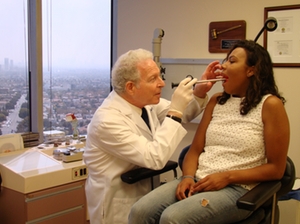

Voice and Swallowing Disorders
- Evaluation and treatment of hoarseness and vocal cord weakness
- Evaluation and treatment of swallowing disorders
- Evaluation and treatment of benign & malignant vocal cord/laryngeal lesions
Our voice is something we use daily, but,
probably gets the least care and attention.
Here are some tips for keeping your voice in shape!
- Drink water (stay well hydrated): Keeping your body well hydrated by drinking plenty of water each day (6-8 glasses) is essential to maintaining a healthy voice. The vocal cords vibrate extremely fast even with the most simple sound production; remaining hydrated through water consumption optimizes the throat’s mucous production, aiding vocal cord lubrication. To maintain sufficient hydration avoid or moderate substances that cause dehydration. These include alcohol and caffeinated beverages (coffee, tea, soda). And always increase hydration when exercising.
- Do not smoke: It is well known that smoking leads to lung or throat cancer. Primary and secondhand smoke that is breathed in passes by the vocal cords causing significant irritation and swelling of the vocal cords. This will permanently change voice quality, nature, and capabilities.
- Do not abuse or misuse your voice: Your voice is not indestructible. In every day communication, be sure to avoid habitual yelling, screaming, or cheering. Try not to talk loudly in locations with significant background noise or noisy environments. Be aware of your background noise when it becomes noisy, significant increases in voice volume occur naturally, causing harm to your voice. If you feel like your throat is dry, tired, or your voice is becoming hoarse, stop talking.
- To reduce or minimize voice abuse or misuse use non-vocal or visual cues to attract attention, especially with children. Obtain a vocal amplification system if you routinely need to use a loud voice especially in an outdoor setting. Try not to speak in an unnatural pitch. Adopting an extremely low pitch or high pitch can cause an injury to the vocal cords with subsequent hoarseness and a variety of problems.
- Minimize throat clearing: Clearing your throat can be compared to slapping or slamming the vocal cords together. Consequently, excessive throat clearing can cause vocal cord injury and subsequent hoarseness. An alternative to voice clearing is taking a small sip of water or simply swallowing to clear the secretions from the throat and alleviate the need for throat clearing or coughing. The most common reason for excessive throat clearing is an unrecognized medical condition causing one to clear their throat too much. Common causes of chronic throat clearing include gastroesophageal reflux, laryngopharyngeal reflux disease, sinus and/or allergic disease.
- Moderate voice use when sick: Reduce your vocal demands as much as possible when your voice is hoarse due to excessive use or an upper respiratory infection (cold). Singers should exhibit extra caution if one’s speaking voice is hoarse because permanent and serious injury to the vocal cords are more likely when the vocal cords are swollen or irritated. It is important to listen to what your voice is telling you.
Tips from the American Academy of Otolaryngology — Head and Neck Surgery of which Dr. Finerman is a proud member.

